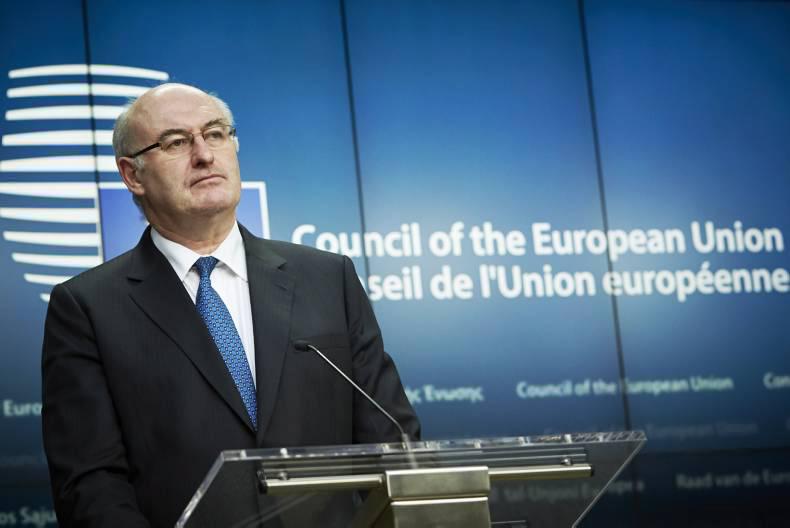The main issues discussed at Tuesday meeting of EU agriculture ministers were the relationship between agriculture and climate, in light of the Paris climate agreement, animal welfare and the market situation, particularly within the dairy sector.
In today's council, Commissioner Hogan and Commissioner Cañete presented the state of play of the implementation of the climate agreement in Paris. The discussion focused in particular on the role of agriculture mitigating climate change. Agriculture is responsible for 10% of greenhouse gas emissions, the council heard, but it can also be part of the solution.
"I'm working very closely with Commissioner Cañete in relation to how agriculture can contribute to our climate change targets, and in particular in the context of LULUCF, forestation, forest management, and the role that soil can play in terms of meeting the the targets. It's in that context that we are having interservice consultations about what contribution that the credits arising from LULUCF can make towards assisting agriculture to meet the challenge, and the balance between food security and sustainable agriculture.
We will make sure that the interests of the agriculture sector will be well reflected
"I think the package the Commissioner will reveal in July will reflect the contribution that the agriculture sector must make in relation to the implementation of COP21," Commissioner Hogan said.
The issue will will also be discussed at the environment council. "We will make sure that the interests of the agriculture sector will be well reflected there," it was heard.
Market situation
In relation to the dairy market situation, Commissioner Hogan updated the council of the implementation of the March package.
"All of the measures that were announced on 14 March will be implemented by tomorrow (Wednesday), and on 13 April we introduced the regulations to give effect to article 222 in relation to the dairy sector.
"The dairy situation remains very weak, with production continuing to increase significantly. There were increases in the first three months of the year of 5% in the EU. Germany, The Netherlands, Denmark, the UK, and Ireland, to greater or lesser extent, have been responsible for this increase," he said.
Intervention
At Tuesday's meeting, Minister for Agriculture Michael Creed called on the Commission to re-examine the volume limit for fixed price intervention for Skimmed Milk Powder (SMP).
"Intervention remains the most effective means available to deal with volatility. Demand for it is very high, and I have therefore called on the Commission to provide for a further increase in the volume limit for fixed price intervention for SMP. I think this increase needs to be effected soon, and it should be substantial. I have also asked the Commission to give favourable consideration to a higher rate of advance payments in 2016, removal of customs tariffs and anti-dumping duties on the importation of fertilisers and a deferral of superlevy payments, among other measures," he said.
Referring to the proposals agreed in March on voluntary controls, the Minister reiterated that “these must be the limit of how far the discussion on control extends. They must remain temporary, strictly voluntary at both producer and Member State level and must be funded at Member State level only, if desired.”
Animal welfare
Minister Creed also welcomed the publication by the European Commission of the survey on animal welfare, and supported the implementation of an EU animal welfare platform, of which there will be more concrete plans in next council meeting.
"In terms of the work of the proposed animal welfare platform, we strongly believe that it would be most useful to focus on the implementation of existing European Union legislation in order to assist in the uniformed enforcement of existing provisions across all European Union member states. We also agree that animal welfare issues should be included in international trade negotiations. European Union farmers need a level playing field. trade distortions in this regard should be eliminated.
"If a platform is to be established, I suggest that it should focus its initial work on knowledge transfer on research and information on animal welfare to relevant stakeholders, the consistent application of council regulation 1099 on the protection of animals during the time of slaughter, and the creation of an animal welfare education programme at European level to inform citizens of best practice in the area of animal welfare," he said.





SHARING OPTIONS